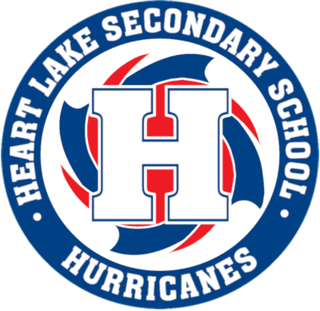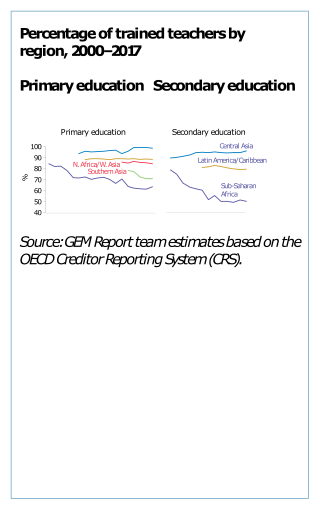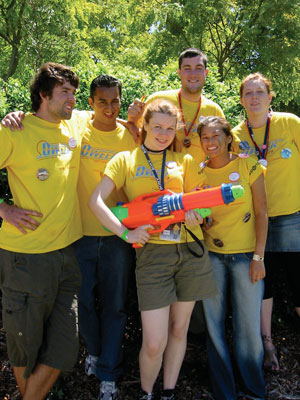Related Research Articles
A resident assistant (RA), also known by a variety of other names, is a trained peer leader who coordinates activities in residence halls in colleges and universities, mental health and substance abuse residential facilities, or similar establishments.

The Virginia Tech Corps of Cadets (VTCC) is the military component of the student body at Virginia Polytechnic Institute and State University. Cadets live together in residence halls, attend morning formation, wear a distinctive uniform, and receive an intensive military and leadership educational experience similar to that available at the United States service academies. The Corps of Cadets has existed from the founding of the Virginia Agricultural and Mechanical College in 1872 to the present-day institution of Virginia Tech, which is designated a senior military college by federal law. As of August 2021, about 1,200 cadets are currently enrolled in the program.

Heart Lake Secondary School, commonly known as HLSS or Heart Lake, is a public secondary school in Brampton, Ontario, Canada. It is located at the corner of Conestoga Drive and Wexford Road. The school was founded in 1988 and is a part of the Peel District School Board. The school has 1150 students enrolled as of September 2019.

Venturing is a core program of the Boy Scouts of America for young men and women ages 14 through 20. It is one of the Boy Scouts' three programs for older youth, which also include Sea Scouts and Exploring. The purpose of Venturing is to provide a positive environment where youth members, called Venturers, can lead the adventure, take on new leadership roles, and mature into responsible adults.
Mathematics, Engineering, Science Achievement (MESA) is an academic preparation program for pre-college, community college and university-level students. Established in 1970 in California, the program provides academic support to students from educationally disadvantaged backgrounds throughout the education pathway so they will excel in math and science and ultimately attain four-year degrees in science, technology, engineering or math (STEM) fields. The program has successfully been replicated in over a dozen other states.

Outdoor education is organized learning that takes place in the outdoors, typically during school camping trips. Outdoor education programs sometimes involve residential or journey wilderness-based experiences in which students participate in a variety of adventurous challenges and outdoor activities such as hiking, climbing, canoeing, ropes courses and group games. Outdoor education draws upon the philosophy, theory, and practices of experiential education and environmental education.

Eagan High School (EHS) is a public high school in east-central Eagan, Minnesota, United States. The school opened in fall 1989 for ninth-grade students and for grades ten through twelve the following year. It is particularly noted for its fine arts programs and use of technology. As of the 2022-2023 school year, EHS had 2,171 students.

Teacher education or teacher training refers to programs, policies, procedures, and provision designed to equip (prospective) teachers with the knowledge, attitudes, behaviors, approaches, methodologies and skills they require to perform their tasks effectively in the classroom, school, and wider community. The professionals who engage in training the prospective teachers are called teacher educators.

Student orientation or new student orientation is a period before the start of an academic year at a university or tertiary institutions. A variety of events are held to orient and welcome new students during this period. The name of the event differs across institutions. Post-secondary institutions offer a variety of programs to help orient first year students. These programs can range from voluntary community building activities to mandatory credit-based courses designed to support students academically, socially, and emotionally. Some of these programs occur prior to the start of classes while other programs are offered throughout the school year. A number of research studies have been done to determine the factors to be considered when designing orientation/transition programs.
Peer mentoring is a form of mentorship that usually takes place between a person who has lived through a specific experience and a person who is new to that experience. An example would be an experienced student being a peer mentor to a new student, the peer mentee, in a particular subject, or in a new school. Peer mentors are also used for health and lifestyle changes. For example, clients, or patients, with support from peers, may have one-on-one sessions that meet regularly to help them recover or rehabilitate. Peer mentoring provides individuals who have had a specific life experience the chance to learn from those who have recovered, or rehabilitated, following such an experience. Peer mentors provide education, recreation and support opportunities to individuals. The peer mentor may challenge the mentee with new ideas, and encourage the mentee to move beyond the things that are most comfortable. Most peer mentors are picked for their sensibility, confidence, social skills and reliability.
Marana High School is one of three high schools for the town of Marana, Arizona. It was established in 1975.

Urban Prep Academies is a nonprofit organization that operated three free open-enrollment public all-male college-preparatory high schools in Chicago. Founded in 2002, and receiving its first charter approval from Chicago Public Schools in 2005, it operates the first all-male public charter high school in the United States. The network opened a second campus in 2009 and a third in August 2010. From 2010 to 2019, 100% of the seniors in the school's graduating classes were admitted to four-year colleges or universities. In 2023 its charter was revoked over misconduct allegations and Chicago Public Schools moved to take over its campuses. The decision is controversial and is being contested in court.
The First-Year Experience (FYE) is a program at many American colleges and universities designed to help students prepare for the transition from high school to college. FYE programs often foster the participation of students in co-curricular events such as common reads, concerts, art exhibits, guest lectures, and organic leadership development initiatives.
Vidyodaya School is a private college-preparatory combined-grades school located in Thevakkal, Kochi, India. It provides comprehensive school education from lower primary to grade 12.
Wollemi College is an independent Roman Catholic school for boys, located in the western Sydney suburb of Werrington, New South Wales, Australia. Situated on 10 hectares, the college was founded in 1999 and provides a personalised education for students from Year 2 to Year 12. Oversight of the college is administered by Parents for Education Foundation (PARED), which is affiliated with Opus Dei.

The California Association of Student Councils (CASC) is a non-profit, student-led youth leadership and advocacy organization. Founded in 1947 by the California Department of Education and the Association of California School Administrators, CASC has provided a multitude of conferences to students, advisors, and professionals in both California and around the world.
The International Mentoring Program (IMP) is a student-based program at Brown University that offers social, academic, and educational support to incoming international students. The aim of the IMP is to assist incoming students in their transition to Brown University and the United States by providing each student with a mentor who provides advice and acts as a resource to them. These mentors are upper classmen who communicate with the international students throughout the academic year to offer support to the new students in their transition.
Appreciative Advising (AA) represents an academic advising approach designed to enhance student-advisor interactions, whether in one-on-one or group settings. Rooted in David Cooperrider's organizational development theory of appreciative inquiry, this philosophy aims to foster positive student experiences and outcomes.

The DO-IT Center is based at the University of Washington (UW) in Seattle, Washington. Founded in 1992, DO-IT’s mission is to increase the successful participation of people with disabilities in postsecondary education and careers, in STEM fields and careers, and in computing fields and careers throughout the U.S. It directs the national AccessSTEM program, and co-directs the national AccessComputing Alliance focused on engaging people with disabilities in computing fields.

The Brown Center for Students of Color (BCSC), formerly known as the Third World Center, is a center for the support of students of color at Brown University. Founded in 1972 at Brown University in Providence, Rhode Island, the Center is "a place and space for students of color to explore their identity, develop their leadership skills, and build a sense of community in a welcoming and supportive environment." The BCSC was founded out of a rich history of student activism and organizing, a history that is honored in its mission today.
References
- ↑ "The Boomerang Project | Providing Premier High School & Middle School Orientation Programs". www.boomerangproject.com. Retrieved 6 April 2024.
- ↑ Bauer, Claire. "Link Crew Leads the Way". the Rock Online. Retrieved 6 April 2024.
- ↑ Mergen, Rachel (15 December 2019). "WEB, Link Crew help unite students of different ages in the Winona Area Public Schools". Winona Daily News. Retrieved 19 December 2019.